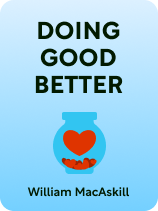

This article is an excerpt from the Shortform book guide to "Doing Good Better" by William MacAskill. Shortform has the world's best summaries and analyses of books you should be reading.
Like this article? Sign up for a free trial here.
Are you looking to make a real difference with your charitable donations? What’s the best way to choose the most impactful charities to support?
William MacAskill’s book Doing Good Better offers valuable insights into selecting effective altruism charities. He provides a framework for evaluating organizations based on their cost-effectiveness, evidence of impact, and funding needs.
Read on to discover MacAskill’s three key criteria for identifying the most worthy charities to support.
Choosing Effective Altruism Charities
For those who choose to pursue high-paying careers so that they can earn to give, MacAskill notes that the final decision is which charities to fund. To find the effective altruism charities most worthy of your donations, he recommends asking three questions: How cost-effective is the charity? How strong is the evidence? And is the charity underfunded?
Criterion #1: Cost-Effectiveness
According to MacAskill, the pivotal factor when assessing a charity is its cost-effectiveness—that is, roughly how many QALYs are saved per dollar donated to the charity?
To answer this question, MacAskill recommends that you first find out what exactly your donation purchases. For example, if you were donating to a charity that provides COVID-19 vaccines in developing countries, you might find out that (say) a $1,000 donation can purchase 200 vaccines. Next, you need to assess roughly how many QALYs your donation saves (for most major charities, this information should be available via public studies and models). For example, you might determine that one COVID-19 vaccine saves (on average) 0.5 QALYs, meaning that your $1,000 donation of 200 vaccines saves 100 QALYs—$10 per QALY.
(Shortform note: Experts point out that concerns over the efficiency of donations are one of the strongest arguments against donating. For example, people often worry that too little of their donation actually goes to those in need—instead, an excessive portion of the donation might go toward charitable organizations’ overhead costs. However, this only strengthens MacAskill’s point: It’s critical to find charities that are as cost-effective as possible.)
Criterion #2: Evidence of Effectiveness
Next, MacAskill advises assessing the evidence of a charity’s effectiveness so that you can know how confident to be about it. In this regard, he points out that peer-reviewed academic publications—especially meta-studies reviewing multiple studies—are the gold standard. Programs organizing direct cash transfers to individuals in developing countries, for instance, have been rigorously tested and found to be highly effective. So, even if one charity seems like it’s slightly less cost-effective than another, that consideration can be outweighed if that same charity has much more rigorous evidence backing its effectiveness.
(Shortform note: Researchers offer several reasons why meta-studies are generally preferable to individual studies. For instance, meta-studies are better able to establish statistical significance than individual studies by virtue of having larger sample sizes to test. They also allow researchers to test hypotheses across various subsets of individuals—in the case of direct cash transfers, for example, meta-studies could determine whether their effectiveness changes depending on the country they take place in.)
Criterion #3: Sufficiency of Funding
Finally, MacAskill writes that you should figure out whether the charity is underfunded, since many of the most cost-effective charities already have sufficient funding (meaning that additional donations deliver less bang for their buck). He says that, to find out which charities need further funding, you can consult GiveWell—a nonprofit dedicated to ranking the most effective charities to donate to every year.
(Shortform note: This website can also help you answer Questions #1 and #2, as it assesses the evidence for charities and their cost-effectiveness. Other websites you can consult when considering donating include charitynavigator.org and charitywatch.org.)

———End of Preview———
Like what you just read? Read the rest of the world's best book summary and analysis of William MacAskill's "Doing Good Better" at Shortform.
Here's what you'll find in our full Doing Good Better summary:
- How you can save hundreds of lives by being a good person
- The principles behind the effective altruism movement
- How to determine which charities are worth funding






